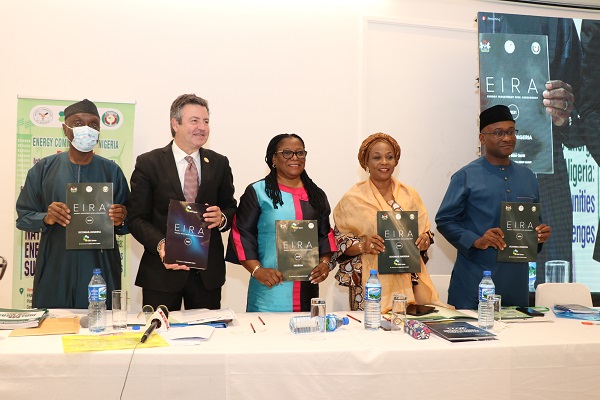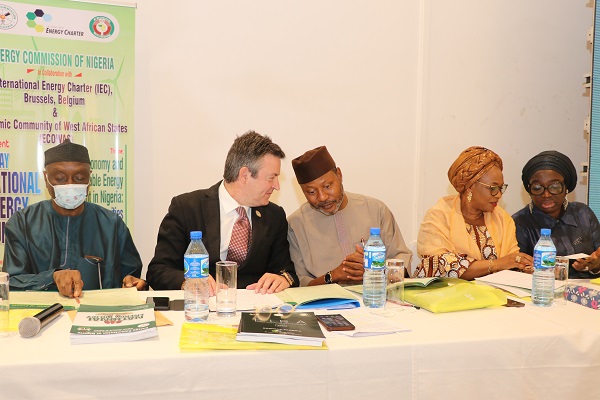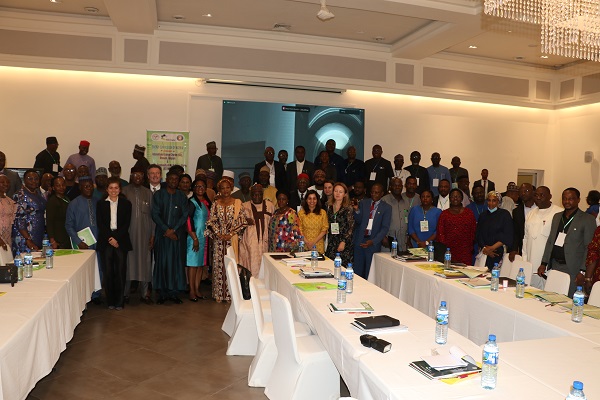
Stakeholders are currently meeting in Nigeria’s capital city, Abuja, to brainstorm on Nigeria’s green economy and sustainable energy development for socioeconomic development.
The four-day meeting holding from (July 4 to 7, 2022) is part of the 2022 National Energy Summit themed “Green economy and sustainable energy development in Nigeria: investment opportunities and challenges” organised by the Energy Commission of Nigeria (ECN) in collaboration with the International Energy Charter (IEC), Brussels, Belgium and the Economic Community of West African States (ECOWAS).
The event brought together energy policymakers, officials in the public sector, investors, members of the organised private sector, professional bodies, energy experts and scholars, academia and development partners to discuss key issues of energy transition.
Declaring the workshop open, the Minister of Science, Technology and Innovation represented by the ministry’s permanent secretary, Mrs. Monilola Udoh, highlighted the nexus between energy and socioeconomic development, adding that Nigeria with its great population and desire for good quality and high standard of living would require an increase in energy demand to 2050/2063.
She, however, averred that Nigeria is endowed with low-carbon energy resources of natural gas and renewable energy such as solar, wind, biomass, hydropower etc., stating that the know-how on energy-efficient and conservation also abounds and is growing.
“For us to capitalise on this asset, to effect energy transition for the green economy for sustainable development, science, technology and innovation must be put in its right place in this country.
“The new infrastructure needed will require key investors both locally and foreign. It is to this effect that the Federal Government, under the leadership of President Muhammadu Buhari since inception in 2015, has been working very hard to provide the needed environment for private investments in the energy sector,” she stated.
Udoh expressed the hope that Nigeria’s membership of the IEC which was approved by President Buhari in the last quarter of 2016 will facilitate foreign direct investment into the Nigerian energy sector to transform it into low carbon or net zero-emission energy system by 2060.

Earlier, in his opening address, the Minister of Environment, Barr. Mohammed Abdullahi, lauded the choice of the theme of the summit, saying it tallied with the global desire for a more sustainable ecosystem, as enshrined in the United Nation’s Sustainable Development Goals (SDGs).
He added that Nigeria’s Energy Transition Plan as approved by the Federal Executive Council early this year promotes pathways to Nigeria’s requirement to achieve net-zero emissions by 2050 and a realistic timeline that balances emission reductions and national economic development imperatives.
The minister commended the commission for organizing the summit which provides an opportunity to discuss and explore challenges, analyse policies and strategies regarding Nigeria’s quest to green its economy and the opportunities therein learn from the experiences of the IEC, ECOWAS and other international development agencies.
“I also hope this energy summit will key into the objectives set out; which is to facilitate investments in the energy industry and promote the requisite platform for a robust consideration of the investment risks and prospects, especially of transitioning from fossil-based economy to an economy driven by low carbon option,” he added.
In his keynote address, the IEC secretary-general, Mr. Guy Lentz, said the summit presented an opportunity to reaffirm the secretariat’s commitment to ongoing cooperation with its partner organisations and observer countries and strengthen its partnership based on shared interests and values.
“Following Nigeria’s pledge at COP 26 to reach net-zero emissions by 2060, I believe green investments are the only means to achieve the country’s economic, social and climate change goals.
“I hope that the Energy Charter Process will be able to support the government of Nigeria in attracting the massive private capital it needs to support large-scale investments in renewables, particularly from green funds and small and medium renewable energy enterprises,” he said.
Lentz commended the government of Nigeria for its continued interest in the Energy Charter Process. He expressed hope that the collaboration will allow it to achieve its ultimate goal of clean and affordable energy access while sustaining its socio-economic transformation and growth and be a flagship for accessing the ECOWAS countries and other African nations.

Earlier, in her goodwill message, the chairman, Senate Committee on Science, Technology and Innovation, Sen. Uche Ekwunife, stated that Nigeria’s Energy Policy establishes a guideline for the protection of the environment in the exploitation of fossil fuels and emphasises the exploitation of renewable and alternative energy sources, especially solar, wind and biomass.
She reiterated the readiness of the National Assembly to facilitate the domestication of any energy-related multilateral agreements that will attract investors to the country.
Similarly, the director of energy and mines at the ECOWAS Commission, Mr. Bayaornibe Dabire, posited that considering the major energy challenges in the region, the commission has decided to prioritise access to sustainable and affordable energy in communities.
“To this effect, ECOWAS has developed several policy documents and set objectives to increase the penetration of renewable in the energy mix through the implementation of efficiency measures,” he stated.
Earlier in his welcome address, the ECN director-general, Prof. Eli Bala, described the green economy as the practice of sustainable development through the support of public and private investments to create an infrastructure that fosters social and environmental sustainability. He described it as a “low carbon, resource-efficient and socially inclusive economy”.
The ECN boss added that the theme of the summit was chosen to capture the global desire for nations to transit from highly fossil-based energy systems to low or no-carbon-based energy systems such as renewables and nuclear as well as energy efficiency best practices.
“This is to mitigate global warming not to exceed 200C by 2030 in line with COP21 climate target and the concomitant disastrous climate effects to humanity,” he added.


